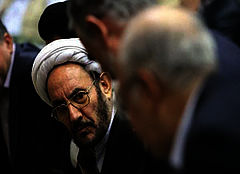Paramilitary Basij Commander Wants Yunesi Court Martialed
» Conflicting News Over Rouhani’s Advisor
While news agencies close to the government and certain government organizations in Iran have published conflicting news reports about president Rouhani’s advisor Ali Yunesi, the commander of the Basij paramilitary force has called for the court martialing of “elements who create conflict between the nations of Iran and Iraq,” a reference to Yunesi whose comments were interpreted in such terms.
On Tuesday, Fars and Tasnim news agencies – both closely associated with the Revolutionary Guards, reported that president Rouhani’s advisor on religious minorities and ethnic groups Ali Yunesi had been summoned by the special clerics court because of certain “peripheral remarks.” A few hours after that his deputy denied the news report blaming unidentified groups and media.
Last week, speaking at a seminar on Iranian identity, Yunesi said that not only was Iraq today part of Iranian civilization, but that it was “our identity, culture, center and capital,” which brought forth much criticism from some Majlis representatives and Principlists politicians and officials who are critical of Rouhani’s administration. According to him, “Iran’s and Iraqis geography is indivisible, as is our culture. We must either fight against each other or become one.” A hundred Majlis representatives called for Yunesi’s resignation through a letter they sent to Rouhani.
Naghdi: Creating Divisions is an Act of Treason
Yunesi’s remarks also brought forth criticism from Iraq and Arab media in countries of the region and forced him to explain his remarks. Among those in Iran who criticized his remarks was the commander of the Basij paramilitary force, Mohammad-Reza Naghdi. “Some individuals say things that create divisions between Iranians and Iraqis,” he said adding that these are acts of treason because they have been said with the aim of creating division. “Such individuals should be court martialed,” he concluded.
This is not the first time that Yunesi’s remarks have created controversy. He had earlier attributed violations of human rights in the country to rogue and extremist individuals, for which he was criticized by hardline Principlists.
The spokesperson for the ministry of justice also criticized Yunesi’s remarks and said he could be prosecuted for them. Months before, while visiting a Jewish temple in Shiraz, Yunesi suggested Iran’s traditional emblem which is also closely associated with the monarchy, the lion and sun, should replace the red crescent which is comparable to the Red Cross and has roots in Islamic teachings. These remarks too brought for a prompt and wide response and attacks.
Some have compared his nationalistic remarks and views to those of president Ahmadinejad’s chief of staff, Isfandiar Rahim Mashai, who also regularly made public nationalistic remarks which prompted harsh responses from religious and other quarters in the country.
Hardline ideologue Principlists who are close to the supreme leader proclaimed that Mashai and his supporters belonged to a “deviant course,” i.e., views that deviate from those of the supreme leader and the revolution.



